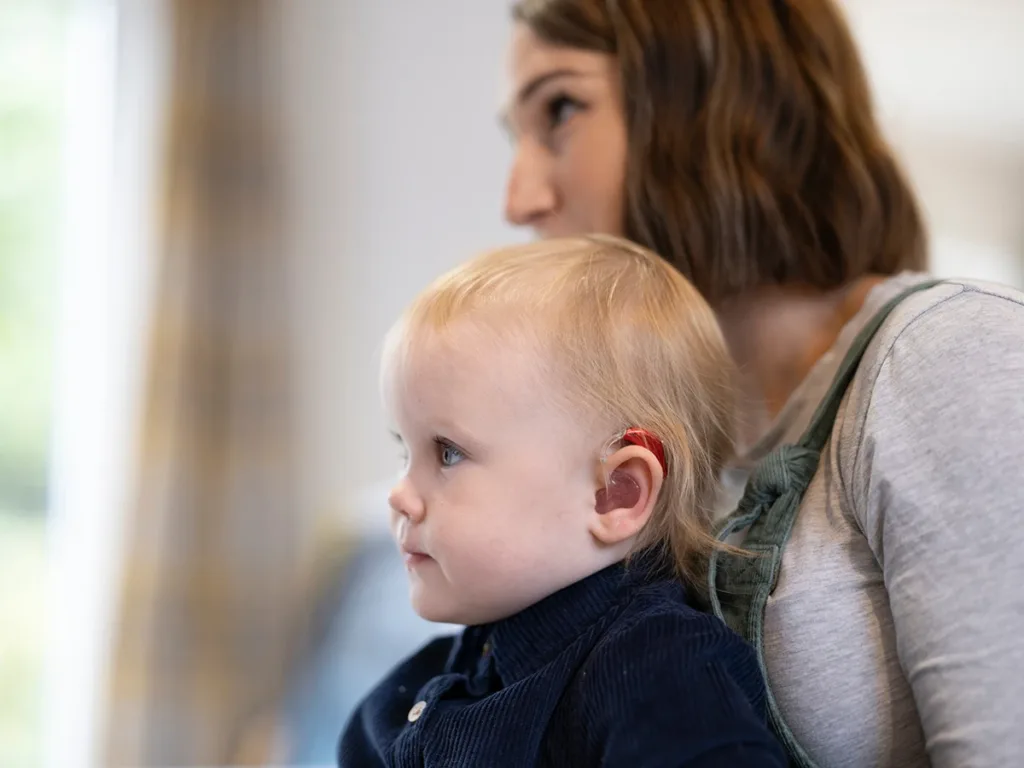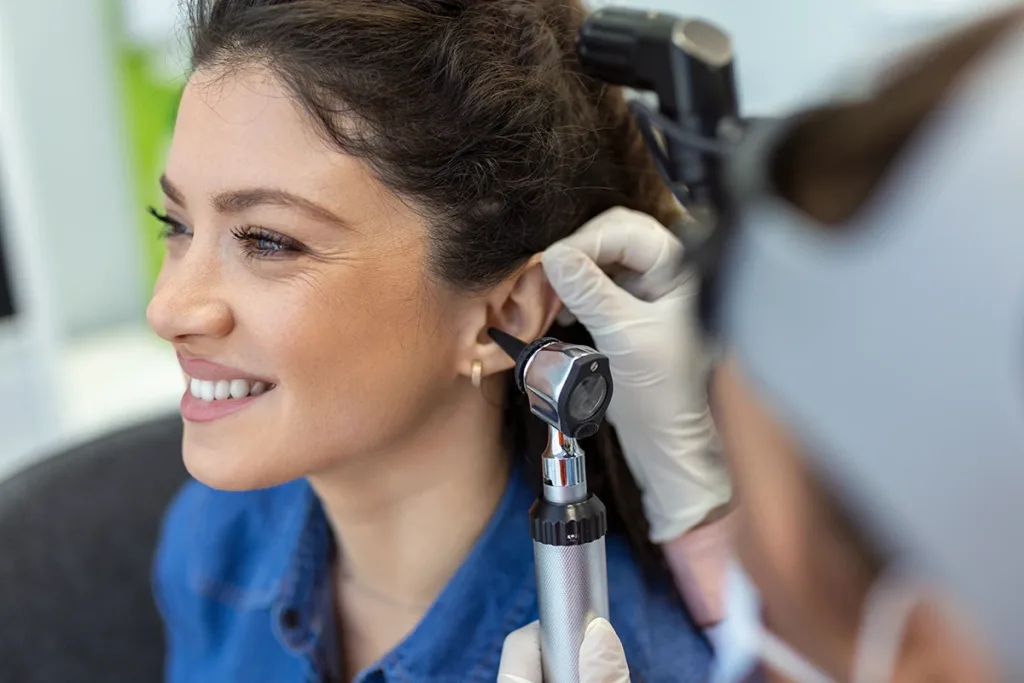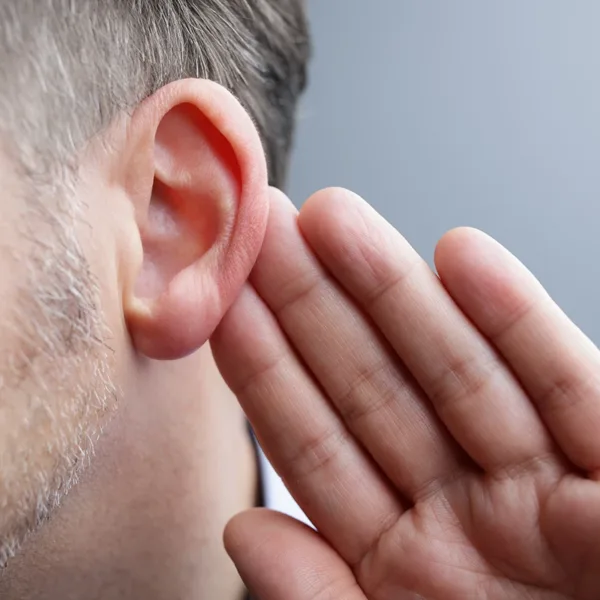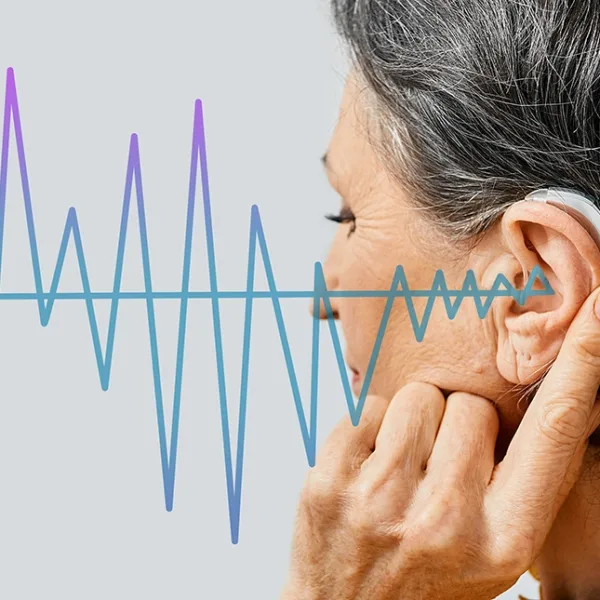
According to the World Health Organization (WHO), hearing loss affects roughly 466 million people in the world. While a variety of factors, including exposure to loud noise, medical issues, and aging, can cause this condition, genetic factors can also play a role in hearing loss. In this guide, we provide an overview of hereditary hearing loss, including the different types, their causes, and how it’s passed down through families. We will also look at genetic and environmental factors that can make some people more susceptible to hearing loss than others.
Understanding Hereditary Hearing Loss
Hereditary hearing loss, also called genetic hearing loss, is an auditory condition passed down through generations of families. It occurs when one or both parents pass the condition down to their child through their genes. Genetic hearing loss often causes hearing issues to present at birth (congenital hearing loss). However, certain genetic conditions can also lead to its development later in life (acquired hearing loss).
Hearing loss can manifest as either sensorineural, conductive, or a combination of both:
- Sensorineural Hearing Loss (SNHL) results from damage to the hair cells in the inner ear (cochlea) and/or the auditory nerve. Most cases of genetic hearing loss are sensorineural.
- Conductive Hearing Loss (CHL) occurs when problems in the outer and/or middle ear block sound waves from reaching the inner ear.
- Mixed Hearing Loss is a combination of sensorineural and conductive hearing loss. This means there is damage in the inner ear or auditory nerve (SNHL) and the outer or middle ear (CHL).
Genetic hearing loss is typically categorized into two main forms, each of which has its own characteristics and implications: syndromic and non-syndromic.
Syndromic Hearing Loss
Syndromic hearing loss refers to partial or total hearing loss associated with other medical conditions. This type of loss accounts for about 30% of genetic hearing loss cases. There are over 400 syndromes currently associated with syndromic hearing loss, and each one can vary greatly in terms of severity, characteristics, and symptoms. These syndromes are caused by mutations in specific genes that not only affect hearing but also other parts of the body.
Some of the most common syndromes associated with syndromic hearing loss include:
- Pendred Syndrome
- Usher Syndrome
- Waardenburg Syndrome
- Branchio-Oto-Renal Syndrome
- Treacher Collins Syndrome
- Stickler Syndrome
- Jervell and Lange-Nielsen Syndrome (JLNS)
Non-Syndromic Hearing Loss
Non-syndromic hearing loss refers to partial or total hearing loss that occurs with no other medical issues or symptoms. Non-syndromic hearing loss is the most common form of genetic hearing loss, accounting for about 70% of all cases.
The characteristics of non-syndromic hearing loss can differ depending on several factors including severity, which can range from mild to profound. It can also impact only one ear (unilateral), or both ears (bilateral).
How Hearing Loss Is Inherited

Hearing loss can be inherited through specific genetic mutations passed down from parents. Genes are segments of DNA that provide instructions for how our body develops and functions. Gene mutations are changes or mistakes in our genes that can alter how they work. Hereditary hearing loss is caused by mutations in the genes responsible for the development, structure, and/or function of any part of the auditory system.
Genes Linked to Hearing Loss
Researchers have identified over 100 genes that play a role in hereditary hearing loss. One of the most common genes linked to hearing loss is the GJB2 gene. This gene is responsible for making a protein called connexin 26 (also called the gap junction protein). This protein is crucial for the proper functioning of the cochlea, which is part of the inner ear responsible for hearing.
Another gene commonly linked to hearing loss is the STRC gene. This gene is responsible for making a protein called stereocilin, which is found in the inner ear. Stereocilin is important for the structure and function of hair cells in the cochlea, which are responsible for detecting sound.
Family History of Hearing Loss
People with a family history of hearing loss are more likely to inherit genetic mutations linked to the condition. Recognizing how hearing loss runs in families, such as whether it affects several generations or certain individuals more severely, is essential for identifying those most at risk.
However, even within a family, not everyone inherits the gene mutation responsible for causing hearing loss. If someone has one or multiple family members with hearing loss, it doesn’t guarantee they’ll inherit it.
Inheritance Patterns
There are four main ways someone can inherit genetic mutations, each of which influences the likelihood they are born with or develop hearing loss later in life:
Autosomal Dominant Inheritance: A single copy of the mutated gene from one parent is sufficient to cause hearing loss. A child has a 50% chance of inheriting the mutated gene if one parent carries it.
Autosomal Recessive Inheritance: Both parents must be carriers of the mutated gene for hearing loss to manifest. Children of carrier parents have a 25% chance of inheriting two mutated copies of the gene. This recessive nature can result in parents who show no symptoms but can pass on the mutation to their offspring.
X-linked Inheritance: The mutated gene is located on the X chromosome and is typically passed from mother to son. Since males have only one X chromosome (XY), they are more likely to be affected. Females, with two X chromosomes (XX), are carriers but may not experience hearing loss unless they inherit the mutated gene from both parents.
Mitochondrial Inheritance: Mutations in mitochondrial DNA is inherited exclusively from the mother and can affect all offspring, male or female. Cases of mitochondrial hearing loss are rare.
There currently isn’t any kind of genetic testing available to determine if a baby will be born with hearing loss. However, almost all hospitals screen newborn babies for hearing loss within the first few days of birth. The hearing screening is non-invasive and painless. They are also essential for determining if additional testing is needed.
How Genetics Influence Hearing Loss Later on in Life

As we age, environmental factors and genetics play a significant role in the development of hearing loss. It’s estimated that anywhere from 35-55% of age-related hearing loss is influenced by genetics.
While research is ongoing, scientists have already identified multiple genes passed down through families that can increase a person’s likelihood of experiencing hearing loss as they age. One study, published in May 2023 by researchers at Yale University, found that the risk of age-related hearing loss can be linked to 54 specific genes interacting with environmental factors.
Genetic and Environmental Influence
The genetic makeup of some people can make their hearing more vulnerable to damage from environmental factors like exposure to loud noise or ototoxic medications. Genetic factors related to health conditions like high blood pressure, heart disease, and diabetes, can also contribute to an increased risk of hearing loss later in life.
Currently, there isn’t any kind of genetic testing available to determine if you have an increased risk of age-related hearing loss. Hearing loss not only affects your ability to hear but can also increase your chances of experiencing mental health issues, and even cognitive decline and dementia. This makes early detection and treatment crucial to prevent the ripple effect that hearing loss can have on your overall health and quality of life.
Find a Clinic Near You to Schedule a Hearing Health Exam Today
If you suspect that you or a loved one may be experiencing hearing loss or if you simply wish to take a proactive approach to your hearing health, scheduling a hearing exam is a crucial first step. At Audibel, our hearing healthcare specialists are dedicated to delivering the personalized care that you deserve.
Don’t wait until hearing loss becomes a significant concern—take charge of your auditory health today by scheduling a hearing exam at an Audibel clinic near you.







Have a question or Comment?